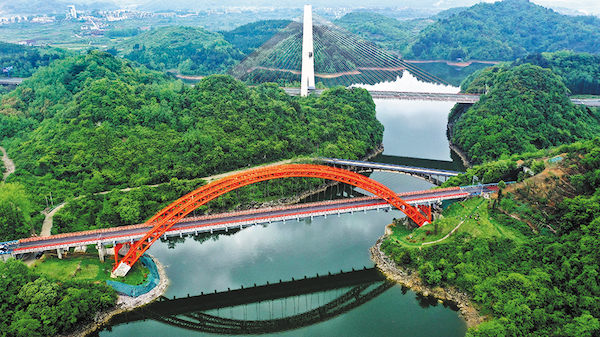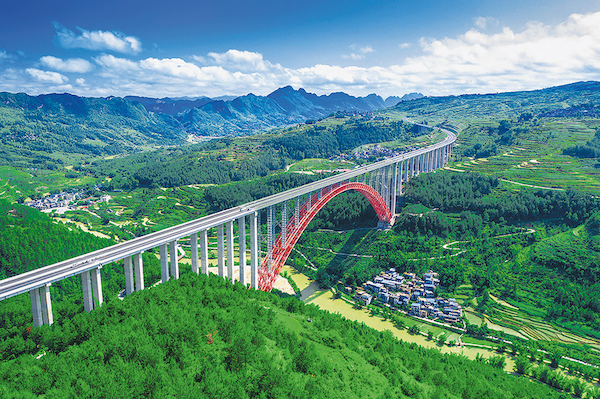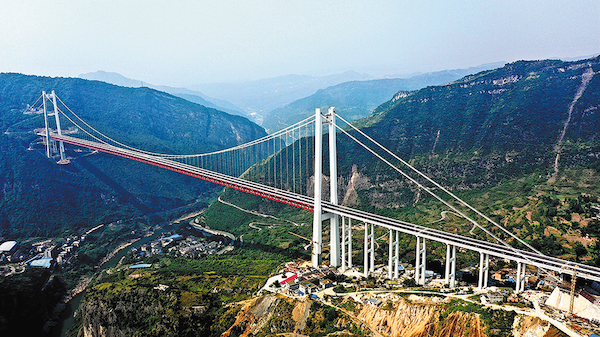Bridges help Guizhou live the high life

Huayudong Bridge in Qingzhen county, Guizhou province, was awarded the Gustav Lindenthal Medal, one of the most prestigious international bridge construction awards. Guizhou has nearly half of the 100 highest bridges in the world. [Photo provided to China Daily]
The province has seen commerce and connectivity rise as a result of major construction projects. LUO WANGSHU reports from Beijing with YANG JUN in Guiyang.
Since it opened in December, a bridge in the southwestern province of Guizhou has become a hit on Instagram, attracting crowds of tourists during January's Spring Festival holiday.
The 1,427-meter-long Dafaqu Grand Bridge, which crosses a deep valley in a mountainous area in the north of the province, is a large-span concrete-filled steel tube arch bridge. It is a key project in a freeway that links the Guizhou cities of Renhuai and Zunyi.
The main arch of the bridge — spanning 410 meters — has been painted red, providing a magnificent spectacle against the backdrop of the mountain and the valley, and drawing many tourists to view the surrounding scenery.
The bridge sits more than 280 meters above the valley floor, equivalent to the height of a 100-story building. The complicated terrain, such as the steep cliffs, meant its construction posed challenges for engineers and building workers.
The difficulties did not weaken official determination to build bridges in the region, though. Since most of Guizhou is hilly, resulting in uneven terrain, construction of roads requires greater investment and more advanced technology than in other areas. As a result, bridges have become a main option in the development of the provincial transportation network.
"In the early days, bridges and tunnels accounted for more than 45 percent of freeways in the province on average," said Liang Xianghua, chief engineer of the provincial transportation commission.
Recently, some freeways have been built with even more bridges and tunnels.
More than 77 percent of a freeway that opened in 2020 and links Jianhe and Rongjiang in Guizhou consists of bridges and tunnels. Construction of the road cost 19.2 billion yuan ($2.79 billion). "The cost was about twice that of building a freeway on the plains," Liang said.
By the end of 2021, the province had 29,660 bridges, including those that were operational and those under construction. Of them, 15,572 were built to facilitate freeways, the provincial transportation commission said.

Daxiaojing bridge, crossing the Dajing River in Luodian county, is a core project of the highway from Yuqing to Anlong in Guizhou. [Photo provided to China Daily]
Prestigious award
Guizhou is home to 49 of the 100 tallest bridges in the world, including four of the 10 tallest, the commission said. Four bridges in the province have won the Gustav Lindenthal Medal, one of the most prestigious bridge construction awards in the world.
Due to the large number of bridges, the different types and the complicated technologies used in their construction, the province has been dubbed "the museum of world bridges", according to the transportation commission.
Beipan Bridge, hanging more than 565 meters above the Beipan, or Nizhu, River in Guizhou, has been certified as the world's highest bridge by Guinness World Records.
The 1,341-meter-long structure opened in December 2016, replacing the Sidu River Bridge in Hubei province as the world's highest such structure.
"Construction is affected by the wind, and it requires a high degree of precision. Transporting materials to the canyon was very difficult. Usually, we transport assembled sections, but on this project we did the opposite by transporting the parts and assembling them on-site," said Wang Chao, the project manager at China Communications Construction, the company that built the bridge.
Another mega suspension bridge is under construction above the wide canyon of the Huajiang River, which is known for its steep cliffs and fast-flowing current.
With a drop of 625 meters to the river, it is expected to become the tallest bridge in the world when it is completed in 2025. It will cut the journey time across the canyon from about an hour to 1 minute.
Deep gorges, steep terrain and the highly developed karst landscape left the project team with few choices but to design such a high bridge, said Wu Chaoming, who managed the building project.
It's not just the high technology used to build the bridges in Guizhou that has attracted attention, but also the spirit associated with it.
The Dafaqu Grand Bridge straddles a local waterway — the Dafa Canal, or Dafaqu in Mandarin — that is named in honor of a local man, Huang Dafa.
The 87-year-old led residents of Caowangba village to excavate and then maintain a 9.4-kilometer-long "life canal" that runs along the side of the karst mountains to bring fresh water to the settlement — a long-cherished dream of local people.

Hongjun bridge over the Chishui River is a part of a highway in Zunyi. [Photo provided to China Daily]
Three pledges
In 1959, when Huang became chief of the village, he decided to do three things for the residents: bring water to them; build a road; and provide access to electricity.
He discovered that a nearby village had water to spare, but the problem was that a mountain lay between them. Nevertheless, he took on the task.
Initially, things did not go well. Knowing very little about water conservancy, Huang was unable to build a workable canal, so after more than 10 years the supply remained a pipe dream.
Although some people said Caowangba would never get access to water, Huang never lost hope.
At the age of 54, while he was working temporarily at the local water management station, he started studying water conservancy technology in his spare time.
After three years, he had learned a great deal about digging canals and was determined to achieve his dream. With his newfound knowledge and persistence, he obtained money from the local government, and in 1992, Huang began overseeing 200 people who helped dig the canal.
Their work paid off in 1995 when water rushed into Caowangba through a 7,200-meter-long main canal and 2,200 meters of branch canals.
With ample water now available, local people were finally able to irrigate their farmland and grow rice. Huang then helped expand the rice-cultivation area in the village to 48 hectares.
Huang was dubbed "a modern Yu Gong", after a figure in Chinese folklore who insisted on moving two mountains in front of his home to lead a more convenient life.
Mocked and questioned by his neighbors, Yu was nonetheless devoted to the task. Impressed by his efforts, the gods helped him move the mountains.
Huang did not receive help from the gods, but his persistence made the impossible possible.

The 800-meter span of Yachihe Bridge is the world's longest steel truss, cable-stay bridge structure. [Photo provided to China Daily]
Key project
The Dafaqu Grand Bridge is the key project of the Renhuai-Zunyi expressway, a 52.4-kilometer, six-lane highway built by Guizhou Highway Development Co with an investment of 12.8 billion yuan.
The project, which includes 101 bridges and 26 tunnels, took four years to complete.
Connecting with the Shanghai-Chengdu expressway, it is part of the Chengdu-Zunyi expressway, according to the national highway network blueprint, and has a designed speed of 100 kilometers per hour.
"The freeway will boost the economic and social development of central Guizhou and promote a connection between the northern part of the province and the Sichuan-Chongqing region," said Xu Yinglu, head of Guizhou Highway Development Co.
The expressway shortens the time for the 52.4-kilometer journey between Zunyi and Renhuai from 90 minutes to about 30 minutes.
The bridge has become a popular tourist spot and the village — which has now changed its name to Tuanjie — has become the best place to gain a magnificent view of the structure.
Cao Lihong, from Zunyi, visited the village with her family during the Spring Festival holiday.
"The journey used to take about two hours, but since the freeway opened it takes about 20 minutes," Cao said, adding that it was pleasant to take a break in the countryside and enjoy the food and leisurely pace of life.
Wang Chaohai, head of Tuanjie, said, "More people are coming to the village and business is booming."
He added that the villagers aim to take full advantage of the convenient transportation link to sell their high-quality rice and other agricultural goods.
Villager Tang Xiaosong said: "We had no water, no electricity, no road, and we were unable to sell agricultural produce to the outside world. Villagers had to walk to the township to buy fertilizer to grow crops. Now, we not only have water and electricity, but also access to the freeway."
Huang Dafa said that building a bridge in such a remote area was not an easy task. "However, it's a bridge that will bring happiness and prosperity to local residents," he said.
Xinhua News Agency, Wang Jin and Zhao Yandi in Guiyang contributed to this story.
Presented by China Daily.
黔ICP备05001922号-3
